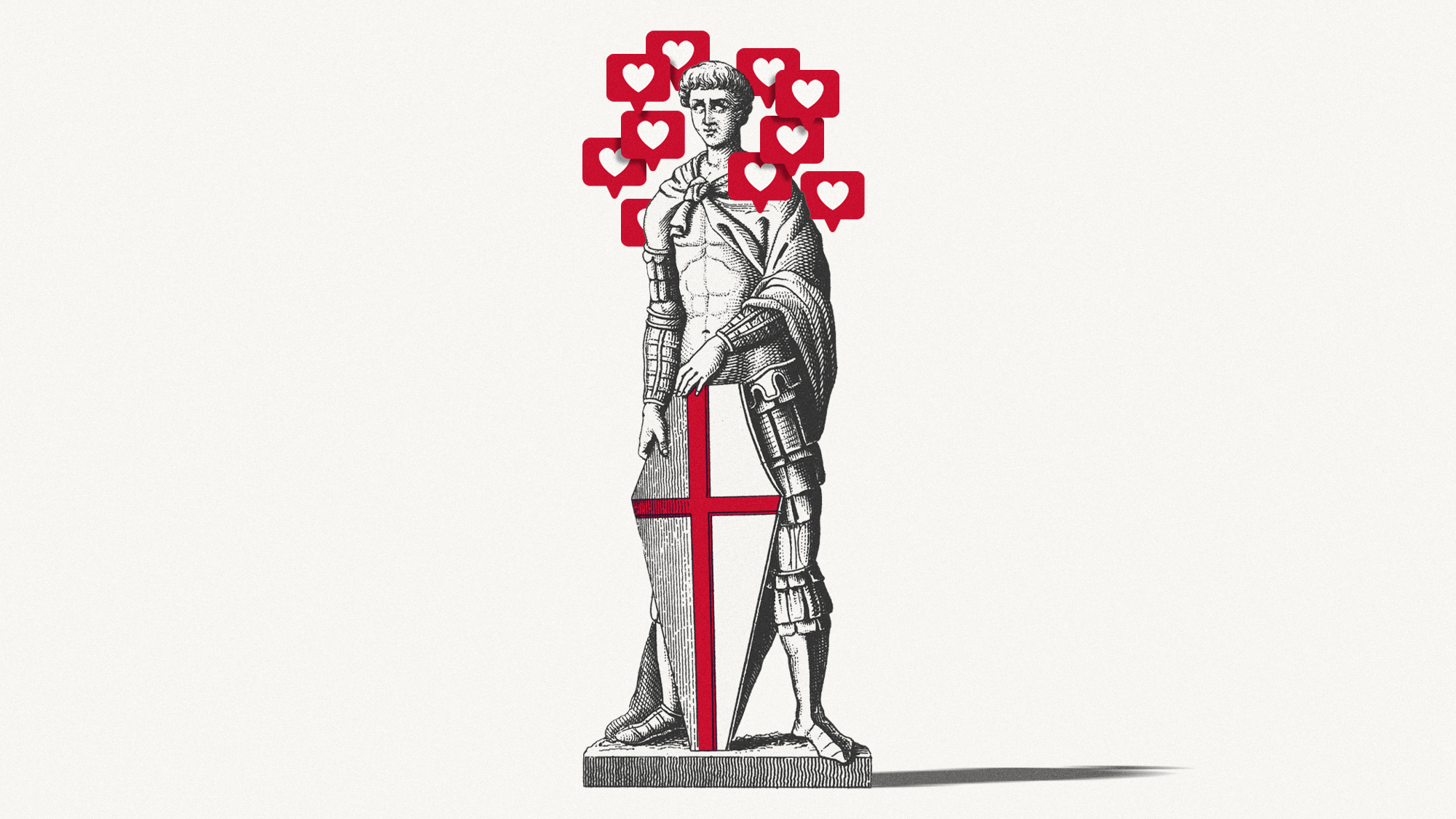Is England coming round to St George's Day?
Keir Starmer urges Labour's general election candidates to 'fly the flag' and celebrate the patron saint

Keir Starmer has written to Labour's general election candidates urging them to celebrate St George's Day "with enthusiasm" in a bid to "outmanoeuvre" the Tories on patriotism and national identity.
It is part of an attempt to "reassure swing voters that the party has changed under his leadership" and moved on from the days of Jeremy Corbyn. Starmer's predecessor as Labour leader "often appeared uncomfortable with British institutions and symbols and argued for a 'progressive patriotism'", said The Guardian.
Writing in The Telegraph, Starmer said that Labour was now the "true party of English patriotism", adding that he had "no time" for those who "flinch" at displaying the St George's flag. He warned against surrendering the flag to the far right, writing: "We cannot allow it to become the preserve of the tiny minority who want to drive hatred in our communities."
The Week
Escape your echo chamber. Get the facts behind the news, plus analysis from multiple perspectives.

Sign up for The Week's Free Newsletters
From our morning news briefing to a weekly Good News Newsletter, get the best of The Week delivered directly to your inbox.
From our morning news briefing to a weekly Good News Newsletter, get the best of The Week delivered directly to your inbox.
In an attack on the Conservatives, he said that they had "lost any right" to call themselves patriotic, and accused them of having "denigrated some of our proudest national institutions" and stoking divisions that "weaken our nation" so long as it "strengthens their grip on power".
What did the commentators say?
Starmer has already been facing "discontent" from some Labour MPs over the prominent use of the union flag in election campaign materials, amid concern it could "alienate ethnic minority voters and others", said The Guardian. But Labour insiders have pointed to 2019 polling from More in Common, which found that 75% of respondents felt that seeing the British flag flying made them feel "good".
Starmer's attempt to persuade voters that "despite the impression they may have formed during the Corbyn years, Labour actually quite likes the country it seeks to govern", is a "mistake", said Michael Deacon in The Telegraph. Starmer's claim is "untrue", said Deacon, who cited a recent poll suggesting that one in eight Labour supporters believe the St George's flag is "racist".
In any case, such a push towards patriotism is "irrelevant" with the outcome of the next election all but a foregone conclusion, said Deacon. It is also "terribly short-termist", he said. "Declaring that your party is 'patriotic' may please a few voters today," he said. "But it's also a surefire way to put off the next generation". Many members of Gen Z believe that British patriotism "is not just uncool, but actively shameful".
A free daily email with the biggest news stories of the day – and the best features from TheWeek.com
Starmer's words could be seen as the "latest cynical spiel" from a man who knows he's about to become this country's prime minister, said Colin Robertson in The Sun, but he is right that we should be "proud to be English" and to "fly the flag".
"Sometimes the incessant howl of outrage about what we have supposedly done wrong as a nation is so deafening it is impossible to think about all that we have unequivocally done right," said Robertson. St George's Day should be used to "take stock of all that is good about England, how far we have come together as a peaceful, hard-working, welcoming and diverse country".
Some 70,000 people had signed a petition arguing that St George's Day should be celebrated as a national holiday, said Femi Oluwole in The Independent. Scotland and Northern Ireland have bank holidays to mark their patron saints' days. But a national holiday "won't restore the pride of people struggling to stay warm and fed" as the country struggles under a cost of living crisis.
There is little appetite for empty nationalistic gestures: "Remember the Festival of Brexit – the £120m celebration that was supposed to mark the amazing triumph of national pride that is Brexit?"
What next?
The truth is that most people in England "probably won't pay much notice" to St George's Day, said Tom Baldwin in The Guardian. It is "a celebration of a long-dead Roman soldier whose connection to England has as much basis in fact as the dragon he was said to have slain", and a day which is "sometimes marred with troublemaking by the far right".
But the past decade has shown that "an obsession with English mythology" isn't confined only to the fringes of politics. In recent years "overly engorged ideas about this country have taken hold in an increasingly stark and polarised debate about its future", said Baldwin, the former Labour spin doctor and author of the recent biography of Starmer.
The "stories we tell ourselves" about national identity matter at any time, "but never more so than in election years when such oversized myths have been pitted against the more everyday thoughts about the country held by the people who live here".
For too long the UK has "clung to myths of grandeur and exceptionalism" as part of its national identity. Perhaps what is needed is "a less puffed-up set of ideas rooted in real lives".
Sorcha Bradley is a writer at The Week and a regular on “The Week Unwrapped” podcast. She worked at The Week magazine for a year and a half before taking up her current role with the digital team, where she mostly covers UK current affairs and politics. Before joining The Week, Sorcha worked at slow-news start-up Tortoise Media. She has also written for Sky News, The Sunday Times, the London Evening Standard and Grazia magazine, among other publications. She has a master’s in newspaper journalism from City, University of London, where she specialised in political journalism.
-
 Which way will Trump go on Iran?
Which way will Trump go on Iran?Today’s Big Question Diplomatic talks set to be held in Turkey on Friday, but failure to reach an agreement could have ‘terrible’ global ramifications
-
 High Court action over Cape Verde tourist deaths
High Court action over Cape Verde tourist deathsThe Explainer Holidaymakers sue TUI after gastric illness outbreaks linked to six British deaths
-
 The battle over the Irish language in Northern Ireland
The battle over the Irish language in Northern IrelandUnder the Radar Popularity is soaring across Northern Ireland, but dual-language sign policies agitate division as unionists accuse nationalists of cultural erosion
-
 Democrats win House race, flip Texas Senate seat
Democrats win House race, flip Texas Senate seatSpeed Read Christian Menefee won the special election for an open House seat in the Houston area
-
 New Epstein files dump strains denials of elites
New Epstein files dump strains denials of elitesSpeed Read Fallout from the files has mostly occurred outside the US
-
 Will Peter Mandelson and Andrew testify to US Congress?
Will Peter Mandelson and Andrew testify to US Congress?Today's Big Question Could political pressure overcome legal obstacles and force either man to give evidence over their relationship with Jeffrey Epstein?
-
 Reforming the House of Lords
Reforming the House of LordsThe Explainer Keir Starmer’s government regards reform of the House of Lords as ‘long overdue and essential’
-
 How ‘Manchesterism’ could change the UK
How ‘Manchesterism’ could change the UKThe Explainer The idea involves shifting a centralized government to more local powers
-
 How long can Keir Starmer last as Labour leader?
How long can Keir Starmer last as Labour leader?Today's Big Question Pathway to a coup ‘still unclear’ even as potential challengers begin manoeuvring into position
-
 What is at stake for Starmer in China?
What is at stake for Starmer in China?Today’s Big Question The British PM will have to ‘play it tough’ to achieve ‘substantive’ outcomes, while China looks to draw Britain away from US influence
-
 Trump sues JPMorgan for $5B over ‘debanking’
Trump sues JPMorgan for $5B over ‘debanking’Speed Read Trump accused the company of closing his accounts for political reasons